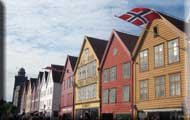 Today there was an article on NRK's website about Norwegian dating habits. Read the article and do the exercises below.
Today there was an article on NRK's website about Norwegian dating habits. Read the article and do the exercises below.
"Nordmenn dater minst" (Source: NRK, Elin Thingvoll Berge, 06-06-08)
Pre-reading:
a) The article is written in nynorsk, so if you are used to reading bokmål, be aware that there will be several differences in spelling, grammatical forms, and sometimes word choices. Later in the exercises, there will be more information about some of the specific differences.
b) In this article, Norwegian dating habits are compared to those in Sweden, Denmark, and Italy. Can you predict where there is more dating and where there is less?
First reading:
a) In newspaper articles, the main ideas can often be found in the title, the photo, the photo caption, and the sub-titles. Look at just these elements and give your best guess as to the main idea in the article.
Main idea: ________________________________
b) Helpful words
- stevnemøte: date / gjennomsnittet: the average / unngår: avoid
a) Now read the article again more carefully and complete the exercises below that address the main points in the article.
- Folk i Italia går på date to ganger så ofte som folk i Skandinavia.
Riktig: ___ Galt: ___ - Hva er den mest populære sommerdaten for både kvinner og menn?
________________________________________________ - Hva er den nest mest populære daten for kvinner?
________________________________________________
For menn?
________________________________________________ - Det er populært å gå på kino når man er på date.
Riktig: ___ Galt: ___
a) Sometimes, it is enough to get the main ideas from an article and then move on to something else. However, if you are interested in this topic and want to gain a more complete understanding of the article, use the resources below to help you.
b) Study the differences between nynorsk and bokmål
- More diphthongs:
meir: mer / fleirtalet: flertallet / eit: et / blei: ble
heilt: helt / seier: sier / meiner: mener - Different pronoun forms:
eg: jeg / me: vi / dei: de - Different verb forms:
invitera: invitere / gjera: gjøre / håpa: håpe
ligg: ligger / gjeld: gjelder / legg: legger
kjem: kommer / tek: tar / passar: passer - Different form of "ikke" and other common words
ikkje: ikke / berre: bare / sjølv: selv
- ei undersøking: a study / skryte: brag / fleirtalet: the majority
tykkjer: think / korga: the picnic basket / føretrek: prefer
ein spasertur: a walk / utandørs: outdoor / til dømes: for example
segling: sailing / passar: fits, is appropriate / støtte: support


No comments:
Post a Comment